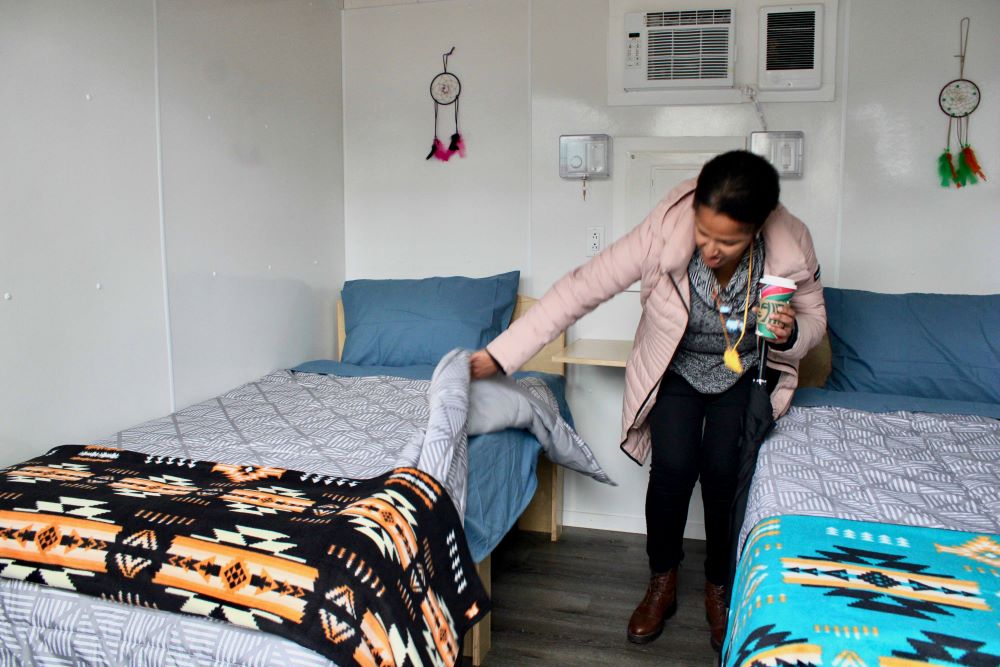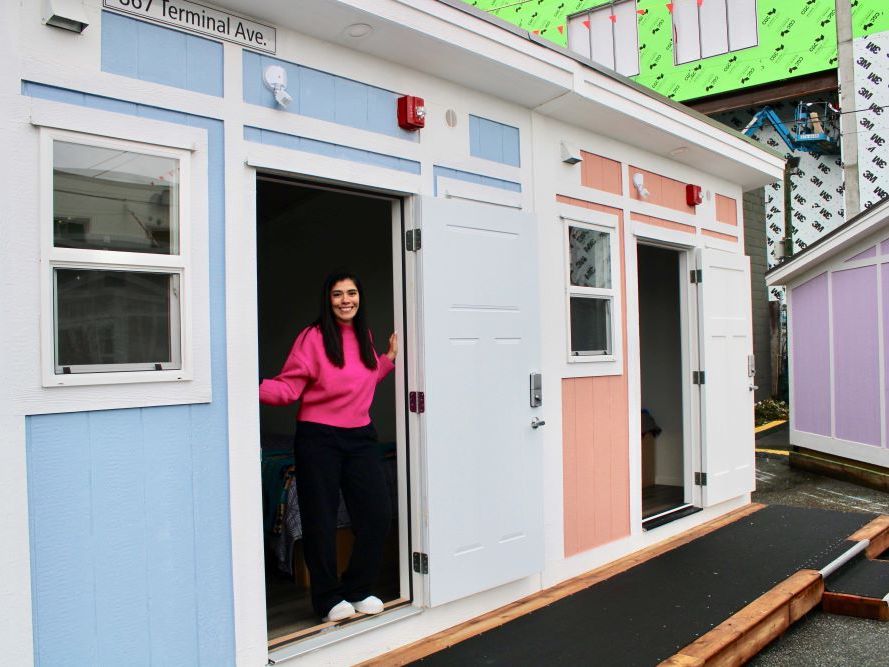It’s billed as an innovative way to provide rudimentary shelter quickly for people who are sleeping outside or trying to stay dry in a tent.
But a Vancouver councillor who pushed the city to try out tiny homes says it took too long to get the pilot project up and running.
“There’s been resistance all the way along,” said Green Coun. Pete Fry, who first proposed the pilot project in February 2022. “When I first introduced this motion [former mayor] Kennedy Stewart wasn’t especially keen on the idea, and I don’t think our staff was either.”
Vancouver is finally ready to open its first tiny home village, a cluster of 10 garden-shed-sized shacks in the parking lot of an existing homeless shelter. The shelters have doors that lock, heating and air conditioning, fire alarms and windows, but lack sprinklers and do not have self-contained bathrooms or kitchens.
Because some of the units are for two occupants, 18 people will be able to shelter in the structures. The one-room cabins are located in a parking lot beside an existing shelter at 875 Terminal Ave. run by Lu’ma Native Housing Society. Residents will access washrooms, showers and meals at the shelter’s main building.
“We’re really trying to reach folks who have chosen not to use the congregate shelters for a variety of reasons,” said Bruk Melles, director of homelessness services for the City of Vancouver.
“We often see adult children with a parent and they don’t really fit into the existing shelter models that exist.”

The 100-square-foot cabins were first approved by city council in February 2022 after Fry introduced a motion to try out the solution to street homelessness.
Media and councillors were initially invited to tour the structures in March, but that tour was cancelled without explanation. In total, it took almost two years since Fry’s original motion to open the 10 simple rooms beside the homeless shelter.
Based on what other cities have done, Fry said he envisioned a much quicker and cheaper deployment. In Victoria, the cost per unit for a similar tiny home village was $15,000. In Duncan, the cost was $7,000 per unit, according to a 2021 story in the Globe and Mail.
Vancouver city staff say they spent the approved $500,000 to get the 10 structures in place but have not provided information about the cost per cabin. “This was the original approved budget based on the research and information collected in order to pursue the project at this site, as this is the first project of its kind in Vancouver,” communications staffer Ali Siemens wrote to The Tyee, saying a budget breakdown won’t be available until January.
“For now, I can provide you the approved capital budget: a total of $1.5 million, $500,000 for capital costs including purchasing the units, shipping, site prep and site servicing,” Siemens told The Tyee, adding that “$1 million has been budgeted for operating costs for the duration of the two-year pilot program.”
When council was discussing Fry’s February 2022 motion, former councillor Melissa De Genova said she was surprised at the $1 million operating cost, pointing out this equated to $6,250 per month for each unit.
At the time, Melles said those costs were in line with the cost of operating a homeless shelter, where staff are on site continuously and services like meals are provided.
The funding was provided by Vancouver’s empty homes tax.
Fry says he prefers the term “rapid deployment shelter” to "tiny home," because the small rooms are nowhere near a permanent home. With no bathroom or kitchen, the cabins are meant to be a temporary space on the way from homelessness to permanent housing.
But he argues the structures are better than sleeping in a tent, a single-room occupancy hotel room that may be infested with bugs or a conventional homeless shelter where people have little privacy and often have to abide by rules such as signing in every day to get a spot.
In a social media post, ABC Coun. Sarah Kirby-Yung wrote that it took too long to get the 10 structures in place, and she doesn’t see them as a “viable solution.”
“There [are] no washrooms,” Kirby-Yung wrote. “Ties up valuable land that should be maximized for long-term more intensified housing use with more units.”
The 10 units are located on a small parking lot beside a former warehouse that has been turned into a homeless shelter.
Fry said that permanent supportive housing is the best option, but “we’re not building it fast enough — the reality is, even when we do commit to building that housing, it takes years.
“The reality is the need is here, now, currently — and we’re not doing an adequate job of addressing that.”
Fry pointed out that not addressing homelessness also has a high cost. ABC, the political party that currently controls council, was voted in on a promise to increase the police budget and presided over the most aggressive decampment of homeless people in recent memory when police and city staff removed a homeless encampment on East Hastings Street in April.
That operation alone cost $550,000 over two weeks, with the bulk of those funds spent on police. Police and city sanitation workers continue to be out in force every day to move homeless people off East Hastings Street.
Homelessness has increased sharply throughout B.C. since 2020, and the most recent homeless count for Vancouver shows a 16 per cent increase between 2020 and 2023. The city now has a total of 2,420 unhoused people.
Recent numbers from the coroner also show homelessness is increasingly deadly. Across B.C., the number of homeless people who died increased by 138 per cent between 2021 and 2022. Vancouver led the province in deaths of unhoused people, with 69 deaths recorded in 2022, up from 57 in 2021. The BC Coroners Service says 93 per cent of these deaths are suspected to be caused by the toxic illicit drug supply.
During a Dec. 6 media tour, Kevin Eaton, executive director of supportive housing at Lu’ma Native Housing Society, said there was already a list of unhoused people who would like to move into the tiny home shelters.
“There’s tons of need,” Eaton said. “There’s a list. There are folks already wanting to move in.” ![]()
Read more: Rights + Justice, Housing, Municipal Politics

















Tyee Commenting Guidelines
Comments that violate guidelines risk being deleted, and violations may result in a temporary or permanent user ban. Maintain the spirit of good conversation to stay in the discussion and be patient with moderators. Comments are reviewed regularly but not in real time.
Do:
Do not: